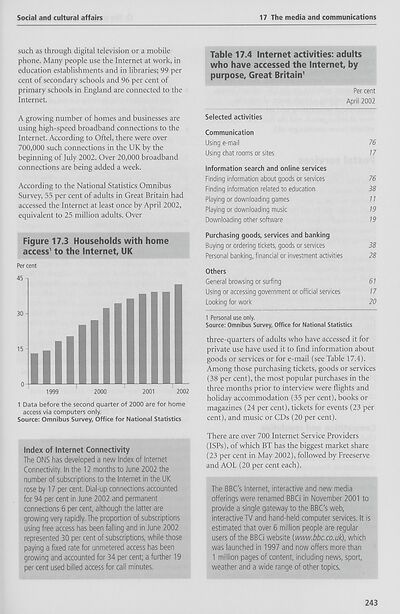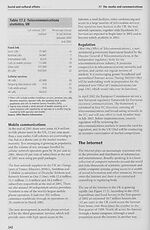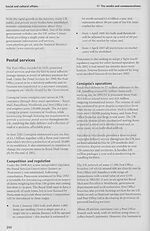Download files
Complete book:
Individual page:
Thumbnail gallery: Grid view | List view

Social and cultural affairs
17 The media and communications
such as through digital television or a mobile
phone. Many people use the Internet at work, in
education establishments and in libraries; 99 per
cent of secondary schools and 96 per cent of
primary schools in England are connected to the
Internet.
A growing number of homes and businesses are
using high-speed broadband connections to the
Internet. According to Oftel, there were over
700,000 such connections in the UK by the
beginning of July 2002. Over 20,000 broadband
connections are being added a week.
According to the National Statistics Omnibus
Survey, 55 per cent of adults in Great Britain had
accessed the Internet at least once by April 2002,
equivalent to 25 million adults. Over
Figure 17.3 Households with home
access1 to the Internet, UK
Per cent
45 -|
1999 2000 2001 2002
1 Data before the second quarter of 2000 are for home
access via computers only.
Source: Omnibus Survey, Office for National Statistics
Index of Internet Connectivity
The ONS has developed a new Index of Internet
Connectivity. In the 12 months to June 2002 the
number of subscriptions to the Internet in the UK
rose by 17 per cent. Dial-up connections accounted
for 94 per cent in June 2002 and permanent
connections 6 per cent, although the latter are
growing very rapidly. The proportion of subscriptions
using free access has been falling and in June 2002
represented 30 per cent of subscriptions, while those
paying a fixed rate for unmetered access has been
growing and accounted for 34 per cent; a further 19
per cent used billed access for call minutes.
Table 17.4 Internet activities: adults
who have accessed the Internet, by
purpose, Great Britain1
Per cent
April 2002
Selected activities
Communication
Using e-mail 76
Using chat rooms or sites 17
Information search and online services
Finding information about goods or services 76
Finding information related to education 38
Playing or downloading games 11
Playing or downloading music 19
Downloading other software 19
Purchasing goods, services and banking
Buying or ordering tickets, goods or services 38
Personal banking, financial or investment activities 28
Others
General browsing or surfing 61
Using or accessing government or official services 17
Looking for work 20
1 Personal use only.
Source: Omnibus Survey, Office for National Statistics
three-quarters of adults who have accessed it for
private use have used it to find information about
goods or services or for e-mail (see Table 17.4).
Among those purchasing tickets, goods or services
(38 per cent), the most popular purchases in the
three months prior to interview were flights and
holiday accommodation (35 per cent), books or
magazines (24 per cent), tickets for events (23 per
cent), and music or CDs (20 per cent).
There are over 700 Internet Service Providers
(ISPs), of which BT has the biggest market share
(23 per cent in May 2002), followed by Freeserve
and AOL (20 per cent each).
The BBC's Internet, interactive and new media
offerings were renamed BBCi in November 2001 to
provide a single gateway to the BBC's web,
interactive TV and hand-held computer services. It is
estimated that over 6 million people are regular
users of the BBCi website {www.bbc.co.uk), which
was launched in 1997 and now offers more than
1 million pages of content, including news, sport,
weather and a wide range of other topics.
243
17 The media and communications
such as through digital television or a mobile
phone. Many people use the Internet at work, in
education establishments and in libraries; 99 per
cent of secondary schools and 96 per cent of
primary schools in England are connected to the
Internet.
A growing number of homes and businesses are
using high-speed broadband connections to the
Internet. According to Oftel, there were over
700,000 such connections in the UK by the
beginning of July 2002. Over 20,000 broadband
connections are being added a week.
According to the National Statistics Omnibus
Survey, 55 per cent of adults in Great Britain had
accessed the Internet at least once by April 2002,
equivalent to 25 million adults. Over
Figure 17.3 Households with home
access1 to the Internet, UK
Per cent
45 -|
1999 2000 2001 2002
1 Data before the second quarter of 2000 are for home
access via computers only.
Source: Omnibus Survey, Office for National Statistics
Index of Internet Connectivity
The ONS has developed a new Index of Internet
Connectivity. In the 12 months to June 2002 the
number of subscriptions to the Internet in the UK
rose by 17 per cent. Dial-up connections accounted
for 94 per cent in June 2002 and permanent
connections 6 per cent, although the latter are
growing very rapidly. The proportion of subscriptions
using free access has been falling and in June 2002
represented 30 per cent of subscriptions, while those
paying a fixed rate for unmetered access has been
growing and accounted for 34 per cent; a further 19
per cent used billed access for call minutes.
Table 17.4 Internet activities: adults
who have accessed the Internet, by
purpose, Great Britain1
Per cent
April 2002
Selected activities
Communication
Using e-mail 76
Using chat rooms or sites 17
Information search and online services
Finding information about goods or services 76
Finding information related to education 38
Playing or downloading games 11
Playing or downloading music 19
Downloading other software 19
Purchasing goods, services and banking
Buying or ordering tickets, goods or services 38
Personal banking, financial or investment activities 28
Others
General browsing or surfing 61
Using or accessing government or official services 17
Looking for work 20
1 Personal use only.
Source: Omnibus Survey, Office for National Statistics
three-quarters of adults who have accessed it for
private use have used it to find information about
goods or services or for e-mail (see Table 17.4).
Among those purchasing tickets, goods or services
(38 per cent), the most popular purchases in the
three months prior to interview were flights and
holiday accommodation (35 per cent), books or
magazines (24 per cent), tickets for events (23 per
cent), and music or CDs (20 per cent).
There are over 700 Internet Service Providers
(ISPs), of which BT has the biggest market share
(23 per cent in May 2002), followed by Freeserve
and AOL (20 per cent each).
The BBC's Internet, interactive and new media
offerings were renamed BBCi in November 2001 to
provide a single gateway to the BBC's web,
interactive TV and hand-held computer services. It is
estimated that over 6 million people are regular
users of the BBCi website {www.bbc.co.uk), which
was launched in 1997 and now offers more than
1 million pages of content, including news, sport,
weather and a wide range of other topics.
243
Set display mode to:
![]() Universal Viewer |
Universal Viewer | ![]() Mirador |
Large image | Transcription
Mirador |
Large image | Transcription
The item on this page appears courtesy of Office for National Statistics and may be re-used under the Open Government Licence for Public Sector Information.
| Britain and UK handbooks > UK: The official yearbook of the United Kingdom of Great Britain and Northern Ireland > 2003 > (273) |
|---|
| Permanent URL | https://digital.nls.uk/204926659 |
|---|
| Attribution and copyright: |
|
|---|---|
| Description | Three volumes of 'UK: The official yearbook of the United Kingdom of Great Britain and Northern Ireland', published annually by the Office of National Statistics from 2002-2005. |
|---|---|
| Shelfmark | GII.11 SER |
| Description | Three titles produced by the British Government from 1954-2005 describing 'how Britain worked'. They are: 'Britain: An official handbook' (1954-1998), 'Britain: The official yearbook of the United Kingdom' (1999-2001), and 'UK: The official yearbook of the United Kingdom of Great Britain and Northern Ireland' (2002-2005). These 50 reports provide an overview of Britain's economic, social and cultural affairs, its environment, international relations, and the systems of government. They give an impartial summary of government policies and initiatives, and explain how public services are organised. |
|---|---|
| Additional NLS resources: |
|

